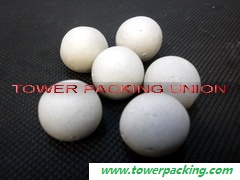Inert Ceramic Ball
Product No: TPU®-ICB

Inert ceramic balls have stable chemical features
and a low rate of water absorption, inert ceramic balls can resist
high temperatures and high pressure. Inert ceramic balls can also
resist the corrosion of acid, alkali and some other organic
solvents, inert ceramic balls are able to stand the thermal shock
(quick change of temperature) during the manufacturing process. The
main role of these inert ceramic balls is to increase the
distribution spots of gas or liquid, and to support and protect the
activating catalyst of low strength in the reactors and
column/tower.
Applications:
As refractory bed top plugs and supports in order to protect the
catalyst bed from thermal impurities so that the catalyst bed is
kept intact in spite of wide pressure variation. Inert Ceramic Ball
is widely used in petrochemical industry, chemical industry,
fertilizer industry, natural gas industry and environment
protection, etc.
Stoneware Catalyst Bed Supports are used routinely in the following
specific services: Ammonia plants, Hydrotreaters, Bender treaters,
Isomerization units, Chloride absorbers, pretreaters and reactors,
Claus units, Molecular sieve units, Diesel hydrotreaters, Naphtha
treaters, Fixed bed reformers, Reformer pretreaters, Fluidized
pollution control, Hydrocrackers (1st stage), VGO pretreaters,
Hydrogen plants.
Inert Ceramic Balls are widely used in many fields, including
petroleum, chemical engineering, fertilizer production, natural gas
and environmental protection. They are used as covering and
supporting materials of catalysts in reaction vessels and as packing
in towers.
Inert Ceramic Balls have stable chemical features and a low rate of
water absorption, resist high temperatures and high pressure, and
also resist the corrosion of acid, alkali and some other organic
solvents. They can stand the change in temperature during the
manufacturing process.
The main role of inert ceramic balls is to increase the distribution
spots of gas or liquid, and to support and protect the activating
catalyst with low strength.
Typical Quality Assurance for Ceramic Ball
-
To analyze the raw material for chemical composition, particle
size and moisture content to ensure consistent properties that
will provide optimum performance of the finished product.
-
Following crumbling and pulverization of the raw material it is
screened to remove coarser particles.
-
After the ground raw material is pre-selected by magnetic
separation it is checked to make sure that the Fe2O3 content is
less than 1%. After aging and soaking, the water content is
checked to ensure it is between 20-24%.
After moulding shapes the product, extruding or hand rolling, a random check is made on dimensions and shapes. -
After the product is dried, a random check to make sure that the
moisture content is less than 3%.
-
During firing the furnace is precisely controlled with regard to
temperature and duration of firing.
-
Every finished item is visually examined to confirm shape, color
and dimensions are within specification.
-
Random tests are carried out to confirm acceptable chemical and
physical properties of the finished product. This includes
testing for specific gravity, compressibility strength, water
absorption, anti-acid strength, etc.
-
Prior to packing the finished product for dispatch the weight of
a unit volume is checked to comply with the specification
limits.
-
Finally, the finished product is certified to comply with the
Customers specification.
Packing
By plastic bag, each bag 25kgs net, palletized.
By super sacks, each big sacks 1000-1400kgs net, palletized.
By steel drum, each drum 300kgs net, palletized.
|
size |
piece density |
surface area |
voidage |
bulk weight |
bulk weight |
|
|
inch |
mm |
pcs/m3 |
m2/m3 |
% |
kg/m3 |
kg/m3 |
|
1/8" |
2 - 4 |
8.000.000 |
720 |
44 |
1.400 |
2.200 |
|
1/4" |
5 - 7 |
4.750.000 |
420 |
44 |
1.400 |
2.200 |
|
3/8" |
9 - 11 |
1.140.000 |
390 |
44 |
1.400 |
2.200 |
|
1/2" |
11 - 13 |
580.000 |
320 |
45 |
1.400 |
2.200 |
|
5/8” |
14 - 17 |
330.000 |
230 |
45 |
1.400 |
2.200 |
|
3/4" |
18 - 21 |
142.000 |
170 |
45 |
1.400 |
2.200 |
|
1" |
23 - 27 |
71.000 |
130 |
45 |
1.400 |
2.000 |
|
1 1/4" |
30 - 34 |
35.000 |
110 |
46 |
1.350 |
2.000 |
|
1 1/2" |
35 - 40 |
19.200 |
90 |
47 |
1.350 |
2.000 |
|
2" |
48 - 56 |
8.000 |
70 |
47 |
1.300 |
2.000 |

